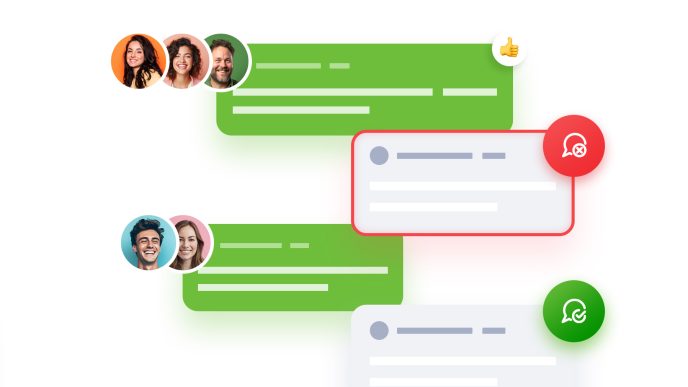You’re familiar with the word “seminar”.
You’ve heard people mention them in professional circles. You’ve been invited to one or two by colleagues. You may have even attended one of these events in the past.
But do you actually know what seminars are and how they differ from conferences? Just as important, do you know how to host one effectively? If not, don’t worry.
In this article, we’ll answer the question, “What is a seminar?” Then we’ll tell you why these events are beneficial to the companies that host them, and how to host one the right way.
Table of Contents
What is a Seminar? A Definition
A seminar is a special event, in which attendees are taught a new concept or technique.
Seminars have traditionally been hosted by businesses in large spaces, such as hotel ballrooms. This has changed in recent years, however. These days companies are just as likely to host their seminars online as they are to host them in physical spaces.
When it comes to seminar speakers, there is no set standard. Speakers can come from inside or outside the organization hosting the event. As long as they have relevant knowledge to share with the target audience, they can take part in the gathering.
It’s important to understand the differences between seminars and conferences. These terms are often used interchangeably, but they are not the same thing.
Seminars often have fewer attendees and speakers, focus on one or two topics, and only last for a few hours—a day at the most. Conferences on the other hand, are often larger events, have more speakers who each talk about different subjects, and last for multiple days.
Should You Host a Seminar For Your Company?
We can’t answer that question for you. We can tell you, though, that seminars are often incredibly beneficial to the companies that host them. Some of these benefits include…
Lead Generation
Seminars give organizations the opportunity to establish brand recognition and authority. Both of these things can help generate quality leads. Think about it: for someone to be considered a legitimate lead, they have to know about and trust your brand. Only then will they be able and willing to purchase your products. Seminars can definitely help your company in this area.
Audience Education
Seminars give organizations a chance to educate their audiences, too. Helping others learn new skills, which they can then use to propel their careers forward and better their lives, is gratifying. It’s also an excellent business strategy. By teaching others, you’ll earn their trust. As we alluded to above, trust often translates into greater sales numbers.
Brand Partnerships
Lastly, seminars provide organizations with partnership opportunities. You can ask other companies to sponsor your event. You can ask individuals at these companies to speak at your event as well. Both strategies will allow you to build professional relationships, which you can use in the future to accelerate brand awareness, generate new leads, and more.
How to Host an Online Seminar the Right Way
Now that we know what seminars are and why they’re beneficial to organizations like yours, we can talk about hosting them effectively. Here’s a simple, five-step process to follow.
(To make sure we’re on the same page, the rest of this article will focus on how to host online seminars, as they’re often easier for organizations to plan and much more cost effective.)
1. Decide What Kind of Seminar You Want to Host
First, decide what kind of seminar you want to host.
There are three options available to you: business seminars, personal development seminars, and academic seminars. Let’s take a closer look at each…
- Business Seminars: These seminars are usually designed for aspiring entrepreneurs and current small business owners. The speakers at these events typically share relevant business-building advice, gleaned from personal experience.
- Personal Development Seminars: These seminars focus on self improvement. People attend these events to learn hard and soft skills, such as how to lead a group of professionals, secure a highly sought-after position, or negotiate a pay raise.
- Academic Seminars: These seminars are often hosted by school districts. The purpose? To help teachers learn new skills and update them on current standards. Because of this, most academic seminars are attended by professional educators.
2. Invest in a Reliable Video Conferencing Solution
You’re planning an online seminar, which means you’ll need to invest in a reliable video conferencing software. There are tons available, but not all are created equal.
Solutions like Zoom are incredibly popular. They can also be used for free, which is definitely a tempting proposition. Unfortunately, Zoom and its contemporaries generally lack the professional features you’ll need to host a truly stellar online seminar.
Invest in a tool like ClickMeeting instead. Our platform is specifically designed to host seminars, webinars, and even online conferences for up to 10,000 people. Features include:
- Custom Branding: Customize the look of your online seminar. Add your brand’s logo, upload your chosen images, and pick your preferred color scheme.
- Audience Engagement: Grab your attendees’ attention (and hold it!) with easy to use screen sharing, digital whiteboards, in-app survey, and moderated chat features.
- Social Media Streaming: Reach more of your target audience by streaming your online seminar on either Facebook or YouTube—all with the click of a button.
- Attendee Statistics: Understand how well your online seminars perform with detailed metrics. Quickly learn who attended and what they thought of your event.
- Seminar Recording: Capture every second of your get-together. Then use the recording to promote your brand in the future. Or sell it to increase revenue.
One of the best things about ClickMeeting is the cost. Sign up for a free 14-day trial. If you enjoy using the tool, commit to a plan, which you can access for as little as $25 a month.
3. Choose the Basic Details of Your Online Seminar
At this point, you know what kind of online seminar you want to host and the software you’ll host it with. Now it’s time to iron out the basic details of your event
When will your seminar take place? What kind of content will you share with attendees? Do you have a sizable budget to work with, or will you be hosting this event on the cheap?
There are a lot of details to work out. We understand if you feel overwhelmed. Just take things slowly. Make one decision, then move to the next one. Eventually everything will be planned.
Also, try to look on the brightside. At least you don’t have to choose (and pay for) a physical venue for your seminar. Doing so adds a whole new dimension of stress to event planning.
4. Create Amazing Seminar Content For Your Audience
Next up, seminar content.
What are you going to teach to potential attendees? We suggest choosing a topic that’s both interesting to your target audience and relevant to the product/services your company offers.
If your company provides social media management services to B2B organizations, for example, you could host a seminar titled “10 Social Media Predictions For 2023.” This is something your audience will find interesting. It may also help you secure new clients.
What if you sell accounting software? A seminar titled, “5 Ways to Save Money on Your Taxes” would probably be a hit with customers, while increasing your brand recognition.
Once you’ve chosen a seminar topic, contact speakers to see if they want to collaborate.
Returning to one of our previous examples, you could partner with 10 different speakers and ask each of them to make a social media prediction for 2023. Just make sure that each prediction is unique and that each speaker only speaks for a predetermined amount of time.
Note: every online seminar is different. But in general, keep sessions to 60 minutes or less. This will allow you to deliver quality information without boring attendees.
5. Promote Your Online Seminar to the World
Finally, market your online seminar to your target audience.
It doesn’t matter how amazing your content is. Or how famous your speakers are. If nobody knows about your event, nobody will show up and it will be a failure.
Fortunately, event marketing isn’t rocket science. Use your company’s email list to promote your seminar. Post about it on social media, too. If you have the budget, try running PPC ads on outlets like Google and Facebook. Do what you have to do to spread the word.
The key to successful event marketing is consistency. Develop a plan, then stick to it. If you do that, you should be able to drum up a sizable audience for your seminar.
Pro Tip: Partner with other organizations when hosting online seminars. This will help you create better content in less time. It will also help you market your event to more people because you can tap into your partner’s audience. Win!
Make Your Seminar the Best it Can Be
Online seminars are valuable marketing and sales tools. After reading this article, you know how to host one effectively. Just remember, your event is only as good as your software.
If you’re still looking for a reliable video conferencing solution, give ClickMeeting a try. Our platform is loaded with easy-to-use, uber-powerful features that will help you connect with your target audience and deliver a satisfying viewing experience they won’t soon forget.
Sign up for your free 14-day trial of ClickMeeting today. We’re confident you’ll love the results!











